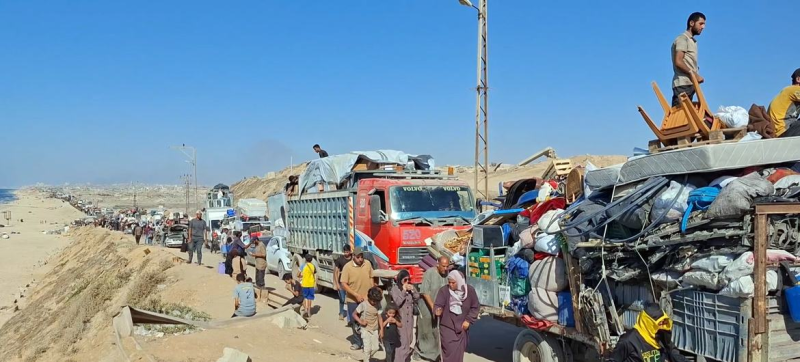- A Genocide Position Paper on the Plight of Palestine |
- Economy must move beyond narrow wealth accumulation: Yunus |
- Guterres Urges Recommitment to Two-State Israel-Palestine Solution |
- WHO Warns of Global NCD Crisis, Calls for Urgent Investment |
- Dhaka’s air turns ‘moderate’ on Tuesday morning |
Offensive Shuts Nearly Half of Gaza Malnutrition Centres

Hundreds of Palestinian families continued to flee Gaza City in the north of the enclave via the overcrowded coastal al-Rashid Street, amid a severe shortage of transportation and soaring travel costs, as Israeli military operations persist in the city.
Hostilities between Israeli forces and Hamas have forced the closure of nearly half of all malnutrition centres in and around Gaza City, the northern area of the Strip where famine was declared a month ago.
According to the UN humanitarian coordination office (OCHA) and its partners, the closures are hampering efforts to detect new famine victims and to continue treatment for hundreds of children.
UN Spokesperson Stéphane Dujarric told correspondents in New York on Monday that the suspension of nutrition services in Gaza governorate is undermining life-saving support amid continuing Israeli restrictions on aid.
“On Friday, the Ministry of Health said that 162 people—including 32 children—have died from starvation and malnutrition since famine was confirmed,” he said.
As Israeli military operations continued across the Strip, Palestinian Civil Defence teams reported that in the past 10 days they had carried out more than 50 rescue and recovery missions.
“Health services are also under severe strain,” Mr. Dujarric added. “Today, the Ministry of Health in Gaza called on people to donate blood amid severe shortages in hospitals.”
He stressed once again that civilians must never be targeted and civilian infrastructure must always be protected.
The growing number of civilians being forced south by Israel’s offensive to retake Gaza City is putting intense pressure on already overstretched services in Khan Younis and Deir al-Balah, where conditions are dire, Mr. Dujarric said.
Tens of thousands are squeezing into tents along the beaches or cramming into school shelters, while others are “sleeping in the open on the rubble of destroyed buildings and houses.”
The UN continues to serve those in need as far as possible. On Monday, seven of 12 humanitarian missions coordinated with Israeli authorities were facilitated, allowing teams to collect health supplies from Kerem Shalom. However, two missions to retrieve food cargo were denied.

